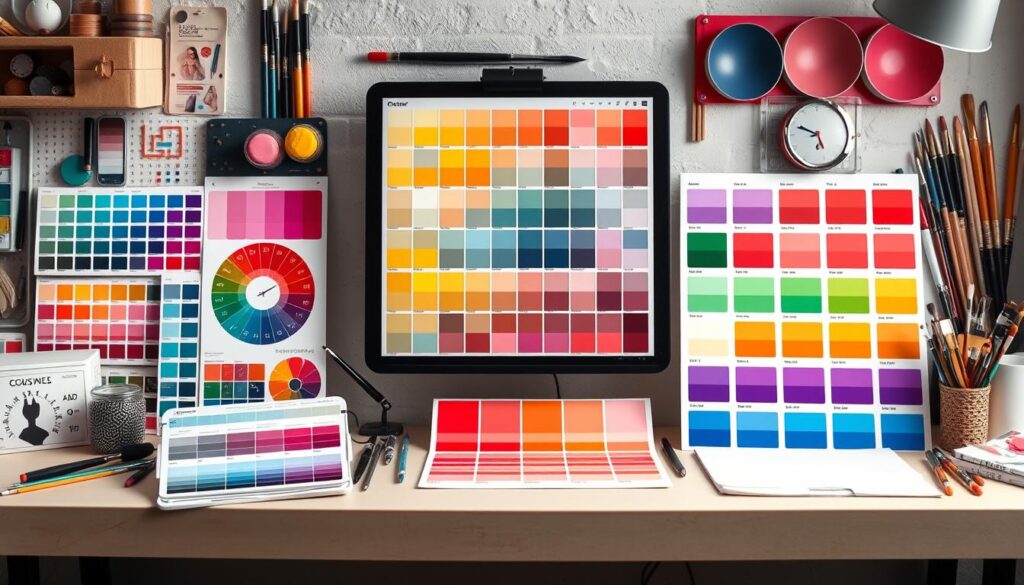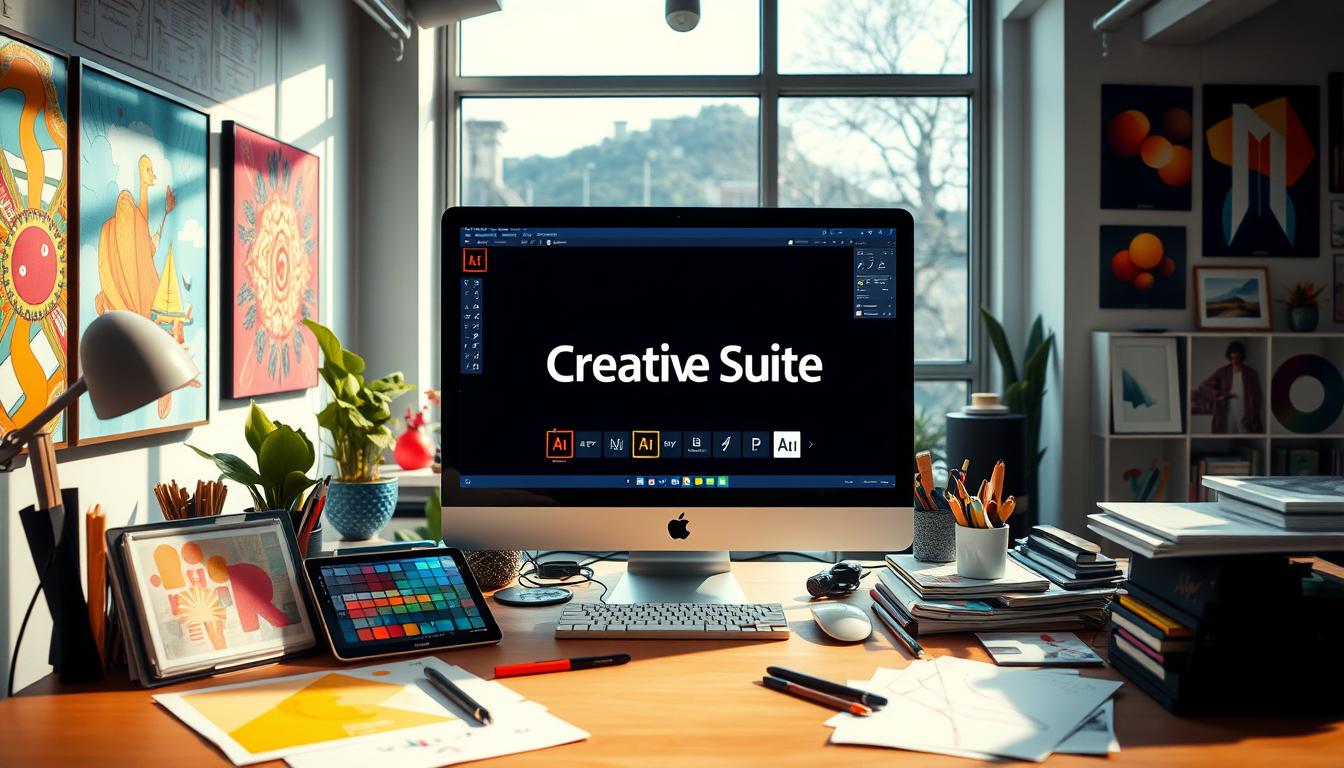As design pros, we’re always looking for ways to improve our work. The Adobe Creative Suite is known for its great tools. But, there’s a hidden feature that can change how we design.
In this article, we’ll show you a feature that can change your design workflow. It can unlock new creativity levels.
Key Takeaways
- Discover a hidden Adobe feature that can significantly enhance your design capabilities
- Understand how this feature can streamline your workflow and boost productivity
- Learn how to leverage this tool to create more visually stunning and impactful designs
- Explore the potential of this feature to unlock new creative possibilities
- Gain insights into how industry-leading designers are utilizing this hidden gem
Discovering Adobe’s Game-Changing Secret Feature
Adobe has always been at the forefront of design software, offering powerful tools that change the game. But there’s a hidden gem that could change your design workflow. This secret feature can unlock new levels of design innovation and creative tools optimization.
What Makes This Feature Revolutionary
This feature is a game-changer for designers. It brings efficiency and flexibility that was once impossible. With the Adobe secret feature, designers can automate tasks and focus on creativity.
It also works well with the Adobe Creative Suite. This means designers can use different creative tools together smoothly.
Why Designers Have Overlooked It
Despite its power, this feature has been overlooked. It’s often hidden behind Adobe’s more famous tools. Some think it’s too complex or hard to use.
But as more designers discover it, the design world will change. This Adobe secret feature will unlock new levels of design innovation and creative tools optimization.
The Evolution of Adobe Creative Suite and Hidden Tools
The Adobe Creative Suite has changed a lot over time. It started as separate design tools and now it’s a powerful all-in-one solution. This change has greatly affected how designers work.
Looking back at the Adobe software history, we see how design tools have evolved. From the early days of Photoshop and Illustrator to today’s suite, Adobe has always been at the forefront. It has shown us what’s possible in digital design.
The Creative Cloud was a big step for Adobe in 2011. It made getting and updating software easier. It also brought out many hidden tools that are now key to design work.
- The introduction of Creative Cloud changed how designers use their tools. It made working together and getting updates easier.
- The Creative Cloud suite has many hidden tools. These tools have made design work more efficient and creative.
- Adobe keeps adding new features to its tools. This has changed how designers work, from better color management to non-destructive editing.
Today, the Adobe Creative Suite shows Adobe’s dedication to innovation. With every creative software update, new features are added. These features encourage designers to explore and use their creativity fully.
«The evolution of the Adobe Creative Suite has been a game-changer for the design industry, constantly pushing the boundaries of what’s possible in the digital realm.»
Adobe Design Tips: Essential Features for Creative Professionals
As a creative pro, using Adobe’s design tools to their fullest is key. You’ll learn quick selection, advanced layer management, and color harmony shortcuts. These features can change how you work and make your designs better.
Mastering Quick Selection Tools
The Adobe quick selection tools are a big deal for designers. They let you pick and edit specific parts of your designs easily. This saves time and makes your workflow smoother. Learning these tools well means you can work faster and more accurately.
Advanced Layer Management Techniques
Good layer management is essential for a tidy design setup. Learn how to organize and work with layers in Adobe projects. Use smart objects and adjustment layers to keep your designs flexible and under control. This keeps your work organized and efficient.
Color Harmony Shortcuts
Color is vital in design, and Adobe has many tools to help. Get to know shortcuts for color harmony, like selective color adjustment and custom schemes. These tools help you fine-tune colors, making your designs feel just right.
Using these Adobe design tips will make your work stand out. You’ll be able to create designs that grab attention. Unlock Adobe’s full power and take your creative work to the next level.
Unlocking Enhanced Workflow Efficiency
In the fast-paced world of design, finding ways to streamline your workflow can be a game-changer. Adobe’s suite of tools offers a wealth of features to help you boost your design productivity, optimize your workflow, and unlock time-saving techniques. Let’s explore how you can leverage these powerful tools to elevate your creative process.
One of the most valuable assets in Adobe’s arsenal is the ability to customize your workspace. By organizing your panels, adjusting keyboard shortcuts, and tailoring the interface to your specific needs, you can create a personalized environment that maximizes your efficiency. This level of customization not only reduces the time spent navigating menus but also helps you maintain a seamless, focused workflow.
Another essential strategy for enhancing your workflow optimization is mastering the art of automation. Adobe’s tools, such as Photoshop’s batch processing capabilities and the flexibility of Action Scripts, allow you to streamline repetitive tasks, freeing up valuable time for more creative endeavors. Automating mundane activities like resizing, cropping, or applying specific filters can significantly boost your time-saving techniques and overall productivity.
| Feature | Benefit |
|---|---|
| Workspace Customization | Personalized interface for enhanced efficiency |
| Batch Processing | Automate repetitive tasks and save time |
| Action Scripts | Customize and streamline your workflow |
By embracing the power of Adobe’s hidden features and optimizing your workflow, you’ll unlock a new level of design productivity and unlock the full potential of your creative process. Explore and experiment with these time-saving techniques to elevate your designs and take your creativity to new heights.

Transforming Your Design Process with Smart Objects
Adobe’s Smart Objects feature has changed the game for designers. It makes non-destructive editing and Adobe integration easy. This has changed how designers work.
Non-Destructive Editing Benefits
Smart Objects are great for non-destructive editing. They protect the original image while you make changes. This lets designers try different things without losing their work.
Integration Across Adobe Applications
Smart Objects work well with the Adobe Creative Suite. They make it easy to move files between Photoshop, Illustrator, and more. This makes design work smoother and more efficient.
Learning about Smart Objects opens up new possibilities. It changes how designers work and helps them create amazing designs.
«Smart Objects have revolutionized the way I approach design projects. The ability to edit non-destructively and seamlessly collaborate across Adobe applications has been a game-changer for my workflow.» – Jane Doe, Graphic Designer
Customizing Your Workspace for Maximum Productivity
To get the most out of Adobe design suite, you need more than just knowing the tools. The real secret is in Adobe workspace customization. By making your workspace your own, you can make your work flow better and be more creative.
One important part of customizing your workspace is to organize your tools well. Productivity hacks like putting often-used tools close and keeping things tidy can really help. Also, setting up custom keyboard shortcuts can save you a lot of time.
Customizing your workspace isn’t just about how things look. It’s also about how you work. You can change colors, fonts, and even set up special workspaces for different projects. This makes your Adobe suite fit just right for you, helping you focus better and work more efficiently.
«The key to maximizing your Adobe productivity is to create a workspace that truly reflects your unique creative process.»
Using Adobe workspace customization can really change how you work. By making your workspace better and using tools that fit you, you can do more and better work with less effort.
Organizing Your Tools for Optimal Accessibility
- Arrange frequently used panels and tools for quick access
- Customize keyboard shortcuts to match your unique working style
- Minimize visual clutter for a focused and distraction-free workspace
Personalizing Your Design Environment
- Adjust interface colors and typography to suit your preferences
- Create custom workspaces for specific projects or tasks
- Explore preset workspace configurations to find the perfect fit
By using Adobe workspace customization, you can make your workspace better and more productive. This lets you do your best work and reach new heights in your designs.
Advanced Color Grading and Manipulation Techniques
Color is incredibly powerful in design. It can change a design’s feel, evoke feelings, and set the mood for a project. We’ll explore advanced color techniques to enhance your designs.
Creating Custom Color Palettes
Making unique color palettes is an art. Knowing color theory and its psychology helps you create perfect palettes. Try new combinations, explore complementary colors, and venture beyond the traditional color wheel.
| Color Palette | Mood | Suitable Design Applications |
|---|---|---|
| Earthy Tones | Warm, Organic, Natural | Branding, Packaging, Websites |
| Vibrant Hues | Energetic, Playful, Attention-grabbing | Advertisements, Social Media Graphics, Product Designs |
| Pastel Shades | Soft, Calming, Feminine | Fashion, Beauty, Childcare |
Understanding Color Psychology in Design
Color psychology is about how colors affect us. It’s key for designers to grasp this to make impactful designs. Learn about color symbolism, cultural meanings, and how to use this knowledge in your work.
«Color is a power which directly influences the soul.» – Wassily Kandinsky
Mastering advanced color grading and color manipulation opens up new creative possibilities. Use custom palettes and design psychology to make your projects stand out and engage your audience.

Integrating AI-Powered Design Elements
The world of design is changing fast, thanks to AI. Adobe’s Adobe Sensei is leading this change. It helps designers work more efficiently and creatively.
AI has made design work easier. Designers can now do repetitive tasks automatically. This lets them focus on the fun parts of their job. AI helps with things like color and layout, making design work better.
Adobe’s Creative Suite has been changed by AI. With Adobe Sensei, designers can try new things. They can play with colors, shapes, and text in new ways. This opens up a world of creative possibilities.
| Feature | Description | Benefits |
|---|---|---|
| Intelligent Object Selection | AI-powered selection tools that precisely isolate and extract desired design elements. | Streamlined workflows, reduced manual effort, and enhanced precision in selection and masking. |
| Automated Layout Optimization | AI algorithms that analyze design compositions and provide intelligent layout suggestions. | Improved visual balance, cohesive design, and time-saving layout generation. |
| Smart Color Harmony | AI-driven color analysis and adjustment tools that enhance color palettes and schemes. | Visually stunning color combinations, efficient color grading, and improved color consistency across designs. |
Designers are excited about AI’s role in their work. With Adobe Sensei, the future looks bright. Designers will keep creating amazing things.
Time-Saving Automation Features
Designers know how slow some tasks can make our work. Adobe’s software has many automation features. These can make our work faster and more productive.
Batch Processing Solutions
Batch processing is a key tool in Adobe’s lineup. It lets you do things like resize or crop many files at once. This saves a lot of time, letting you focus on the fun parts of design.
Custom Action Scripts
Adobe’s scripting is a big deal for more control. With custom scripts, you can automate complex tasks. This means you can make social media assets or send client work automatically. It’s all about making your workflow better.
| Automation Feature | Benefits |
|---|---|
| Batch Processing | Streamline repetitive tasks, save time, and focus on creative work |
| Custom Action Scripts | Automate complex, multi-step processes for enhanced workflow efficiency |
Using these automation tools can really change how designers work. They help you do more in less time. Adobe’s features are great for meeting deadlines or just making your work better.
Real-World Applications and Success Stories
Adobe’s hidden features and advanced techniques have changed the design world. They help professionals in many fields get amazing results. Let’s look at some inspiring stories that show how these tools make a difference.
Jessica Winters, a top graphic designer, always tries new things with Adobe. For a big fashion brand, she used smart objects and non-destructive editing. This let her easily change her designs, creating a strong and beautiful brand identity.
The team at Luminous Studio, a digital agency, uses Adobe’s AI tools for cool user interfaces. These tools speed up their design work. This means they can spend more time on the creative and strategic parts of their projects. They’ve made many award-winning digital experiences that impressed clients and others in the field.




